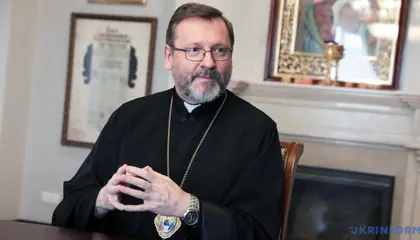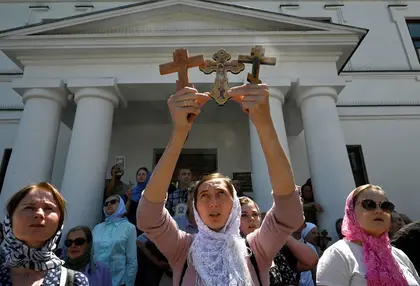The head of the Ukrainian Greek Catholic Church (UGCC), Archbishop Sviatoslav Shevchuk, announced on Feb. 6 that it will change liturgical calendars as of Sept. 31, 2023.
“Taking into account the numerous requests of believers and having conducted preliminary consultations with the clergy and monasticism of our Church … the UGCC in Ukraine will switch… to the new style for immovable holidays, with the preservation of the current Easter,” he said.”
JOIN US ON TELEGRAM
Follow our coverage of the war on the @Kyivpost_official.
A survey of bishops led to the decision. The archbishop said: “If about 70 percent support the decision on reform, then we can move forward. And it turned out that there was support of almost 90 percent in almost every diocese.”
Previously, the UGCC followed the Julian calendar, as opposed to the more recent Gregorian calendar.
The switch means that Ukrainian Catholics will celebrate Christmas on Dec. 25.
Easter, however, will be celebrated on a later date than most of the world’s Catholics and Protestant Christians – putting the UGCC in sync with the Greek Orthodox church.
As for other major holidays, Epiphany will be celebrated on Jan. 6, the Annunciation of the Blessed Virgin Mary on March 25, the Intercession of the Blessed Virgin Mary of Oct. 1, and Saint Nicholas on Dec 6.
The move is indicative of a general trend on the part of Ukrainian Christians to move away from the influence of Moscow, which has controlled Ukrainian religious affairs for centuries.

Ukraine Returns 10 Civilian Prisoners from Russian, Belarusian Captivity
According to a 2021 study by the Razumkov Centre, an independent Ukrainian think tank, 67 percent of adult Ukrainians consider themselves to be believers, the vast majority of them Christians.
Among Christians, 60 percent are Orthodox (of which 45 percent consider themselves loyal to the Kyiv patriarchate and 20 percent to Moscow patriarchate), nine percent belong to the UGCC, and 8.5 percent identify as “simply Christian.”
Ukraine’s Greek Catholics number about 5.5 million and are found mostly in the western regions of the country.
The church was founded at the turn of the 17th century. With the rise of the Polish-Lithuanian Commonwealth in the 16th century, the Roman Catholic Church progressively established a foothold in the traditionally Orthodox Ukrainian territories it controlled. The 1596 Union of Brest led to the creation of the Uniate Church – today known as the UGCC.
Catholic newspaper The Pillar reported that Fr. Vasyl Rudeiko, deputy head of the UGCC’s liturgical commission, is confident most parishes will switch away from the Julian calendar as soon as they are permitted, despite the allowance for communities to adjust more slowly.
Wider discussions
Rudeiko pointed out the timing of the change, emphasizing that it comes while Pope Francis and Patriarch Bartholomew I, head of the Greek Orthodox Church, have been holding discussions about finding a common date for Easter between Catholics and the Orthodox Churches influenced by Constantinople – which currently use the Julian calendar to determine the date of Easter, but do not otherwise adhere to it.
Fr. Rudeiko also noted that the autonomous Orthodox Church of Ukraine, the largest church in the country, is also preparing to move away from the Russian-affiliated Julian calendar.
In fact, the general movement westward of all Ukrainians was on display when Pope Francis met with representatives of the Ukrainian Council of Churches and Religious Organizations (UCCRO) in Rome on Jan. 25.
The delegation included, among others, Archbishop Sviatoslav, who is the current head of the UCCRO, and Metropolitan Epiphanius of the Orthodox Church of Ukraine – Kyiv Patriarchate (OCU), as well as the head of other Christian, Jewish and Muslim religious communities.
For his part, Archbishop Sviatoslav expressed hope that the OCU will make the switch soon. He said he had spoken last year with the Metropolitan Epiphanius about the possibility.
“We are moving towards the same goal. However, we may be moving toward it in different ways,” he said on Monday. “We’ve decided to switch, leaving the possibility to remain on the old calendar for those who aren’t ready. The OCU first allows moving for individual parishes, and only then, as we understand it, the Bishops’ Council of this Church will decide on the calendar reform. So far, we have not set up a joint working group, but I would like to see it work.”
The OCU is expected to discuss calendar reform when its bishops gather in May.
You can also highlight the text and press Ctrl + Enter






